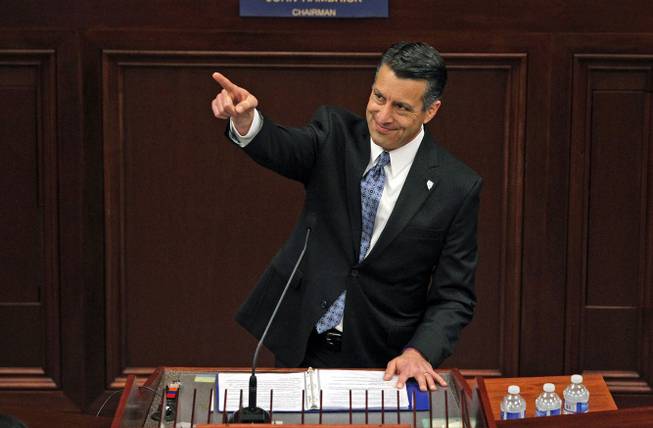
Lance Iversen / AP
Gov. Brian Sandoval acknowledges a guest in the gallery during his State of the State address in a joint meeting of the Nevada Assembly inside the Legislature building Thursday, Jan. 15, 2015, on the capitol grounds in Carson City.
Thursday, Jan. 29, 2015 | 6:30 p.m.
In an attempt to quash uncertainty about his proposal to raise $438 million for education, Gov. Brian Sandoval outlined his tax plan to members of the media today in the Capitol.
Sandoval’s detailed rollout was the first extended look into how the state could levy new revenues from its business license fee. For the first time, he and staff members used fee and tax interchangeably and said it would be levied on a businesses’ gross receipts. Sandoval argued that past proposals to tax gross receipts would have cost taxpayers more.
The meeting comes less than five days before state lawmakers gather in Carson City and 14 days after Sandoval first made the tax pitch at his State of the State speech. Legislators from both parties have mixed views on the proposal, which is expected to raise the $438 million in the next two years. Self-styled fiscal conservatives have slammed the tax proposal for the sole fact that it is a new tax. Moderates and Democrats have both applauded the plan and offered alternatives. The new business fees are one of two tax components the Legislature will vet. The other component is extending the Sunset tax package, worth more than $600 million, for a third time.
The governor used the meeting to cement the business license-fee hike as a critical component necessary for improving the state’s public education system.
“Everybody agrees we need to put more money into education in this state,” he said. “The question is how are we going to do it.”
He said he’s traveled the state pitching his proposal to the business community. With a rasp in his voice, he joked that he’s been doing a lot of explaining. He balked at comparisons some have made to tax proposals from the 2003 and 2011 Legislatures and ballot question 3 in the 2014 election. He also explained that hiking business fees was the easiest solution, saying that doubling the current payroll tax or introducing a new sales tax would have been too complicated. Nevada used the Texas’ license fee as a model for the tax proposal.
As it currently stands, the state’s business license fee is $400 for all businesses. Sandoval’s plan would impose adjusting rates for businesses based upon how they register with the secretary of state and their total revenues. All of the state’s 330,000 business will be subject to paying it quarterly. The highest rate a business will pay is $2.58 million. The lowest would remain at $400 or nothing.
Sandoval is one of eight Republican governors proposing tax hikes nationwide. He’s used to being in the minority when it comes to traditional Republican platforms. He was the first Republican governor to push for creating a state-run health care exchange to implement the Affordable Care Act. He was one of few Republican governors who didn’t gripe about increasing Medicaid eligibility. When it comes to tea-party, no-new-tax conservatives, Sandoval doesn’t fit that mold. But he also assured media at the meeting that his plan, while raising new revenues, would be less costly than what Republicans and Democrats have proposed in the past.
THE MONEY
Ballot question 3 in 2014, the failed measure known as the margin tax, would have been much more costly for industries in the state.
On financial services, Sandoval’s plan would charge $7,106. The margin tax, a 2 percent hike, would have been $77,000, according to analysis from the governor’s office.
The proposal pitched by Gov. Kenny Guinn in 2003, a .25 percent flat rate, would have nearly doubled Sandoval’s plan.
Democrats proposed a .08 percent flat rate tax in 2011 that would have raised more than three times Sandoval’s plan.
NO FLAT RATE
Past proposals suggested flat rates on businesses that earn above a certain baseline. That’s led to criticism about some industries having less of a burden than others. Sandoval’s plan triages what businesses will pay. Gaming revenues are exempt because they are already subject to a tax. Here’s a look at a few industries.
Health Services: .208 percent
Mining: .056 percent
Construction: .091 percent
Education Services: .307 percent
Real Estate: .272 percent
Retail: .121 percent
Accommodation: .218 percent
Food Services: .211 percent

Join the Discussion:
Check this out for a full explanation of our conversion to the LiveFyre commenting system and instructions on how to sign up for an account.
Full comments policy